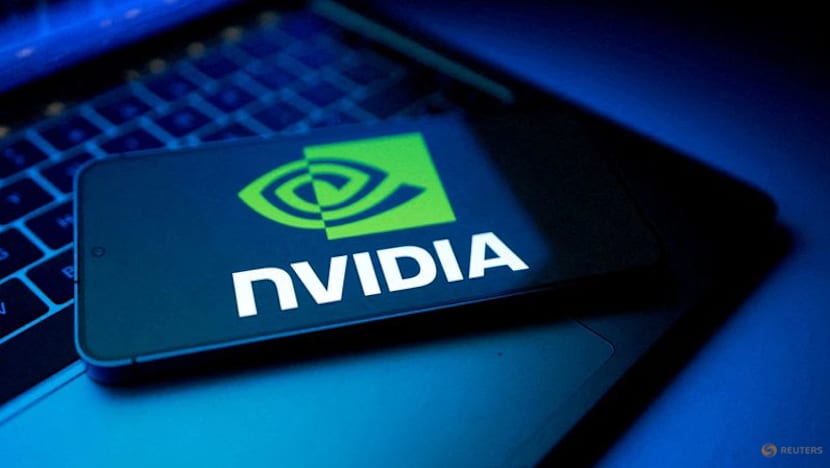World
Nvidia Poised for Historic $5 Trillion Valuation Amid AI Surge

Nvidia is on the verge of achieving a historic milestone, with market analysts projecting its valuation to surpass $5 trillion as early as Wednesday, October 29. This remarkable growth is largely attributed to the ongoing boom in artificial intelligence (AI), which has positioned Nvidia at the forefront of the industry. Shares of the Santa Clara, California-based company surged by 3.1 percent in premarket trading following an announcement from CEO Jensen Huang regarding $500 billion in new AI chip orders and plans to construct seven supercomputers for the US government.
Nvidia’s journey from a niche graphics-chip manufacturer to a pivotal player in the global AI sector underscores its rapid evolution. The company has eclipsed tech giants like Apple, Microsoft, and Alphabet, transforming Huang into a prominent figure in Silicon Valley. Achieving a $5 trillion valuation would mean that Nvidia’s market value would surpass the entire cryptocurrency market and equal approximately half the total value of the pan-European Stoxx 600 index.
Unprecedented Growth and Market Influence
In July, Nvidia reached a $4 trillion valuation, marking a pace of growth that is rarely seen in modern markets. According to Michael Brown, senior research strategist at Pepperstone, “In many ways, everything that could have gone right for the firm has gone right over the last 24 hours.” Analysts attribute this surge to unwavering confidence in AI spending, although some caution against inflated valuations. Nvidia’s significant weight in the S&P 500 and Nasdaq 100 grants it substantial influence over global markets, and its towering valuation raises expectations while also leaving little room for setbacks. The company is slated to announce its quarterly results on November 19.
Nvidia’s ascendancy has not gone unnoticed, drawing scrutiny from global regulators. The US government’s export restrictions on advanced chips have made Nvidia a critical player in Washington’s strategy to limit China’s access to AI technology. Bob O’Donnell from TECHnalysis Research remarked, “Nvidia clearly brought their story to DC to both educate and gain favour with the US government. They managed to hit most of the hottest and most influential topics in tech.”
Geopolitical Considerations and Competitive Landscape
During a recent developer conference, Huang navigated a complex geopolitical landscape. He commended US President Donald Trump‘s “America First” policies for promoting domestic tech investment, while simultaneously cautioning that isolating China from Nvidia’s ecosystem might restrict US access to half of the world’s AI developers.
Despite Nvidia’s dominance, competitors such as AMD and various well-funded startups are actively vying for a share of the high-end AI chip market. Nonetheless, Nvidia remains the preferred choice for many in the industry, with its H100 and Blackwell processors powering numerous large language models behind popular tools such as OpenAI’s ChatGPT and Elon Musk‘s xAI.
As Nvidia approaches this significant financial milestone, the implications for the tech industry and global markets are substantial. The company’s trajectory reflects a broader trend toward increasing investment in AI technologies, which are expected to shape various sectors in the coming years.
-

 Lifestyle3 months ago
Lifestyle3 months agoHumanism Camp Engages 250 Youths in Summer Fest 2025
-

 Sports3 months ago
Sports3 months agoDe Minaur Triumphs at Washington Open After Thrilling Comeback
-

 Business4 months ago
Business4 months agoKenvue Dismisses CEO Thibaut Mongon as Strategic Review Advances
-

 Sports3 months ago
Sports3 months agoTupou and Daugunu Join First Nations Squad for Lions Clash
-

 Top Stories4 months ago
Top Stories4 months agoColombian Senator Miguel Uribe Shows Signs of Recovery After Attack
-

 World4 months ago
World4 months agoASEAN Gears Up for Historic Joint Meeting of Foreign and Economic Ministers
-

 Business3 months ago
Business3 months agoOil Prices Surge Following New EU Sanctions on Russia
-

 Health3 months ago
Health3 months agoNew Study Challenges Assumptions About Aging and Inflammation
-

 Entertainment3 months ago
Entertainment3 months agoDetaşe-Sabah Violin Ensemble Captivates at Gabala Music Festival
-

 Entertainment3 months ago
Entertainment3 months agoBaku Metro Extends Hours for Justin Timberlake Concert
-

 Business3 months ago
Business3 months agoU.S. House Approves Stablecoin Bill, Sends to Trump for Signature
-

 Top Stories4 months ago
Top Stories4 months agoRethinking Singapore’s F&B Regulations Amid Business Closures









